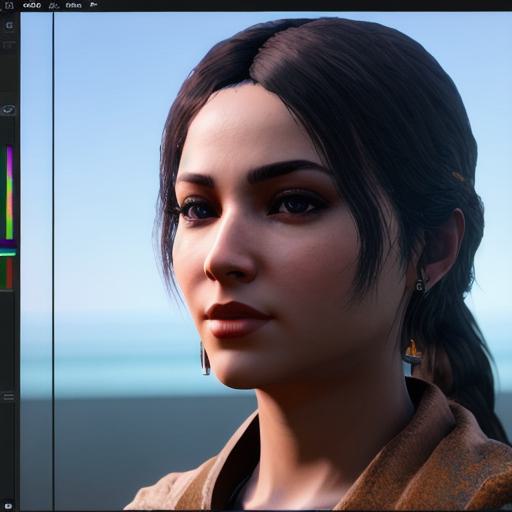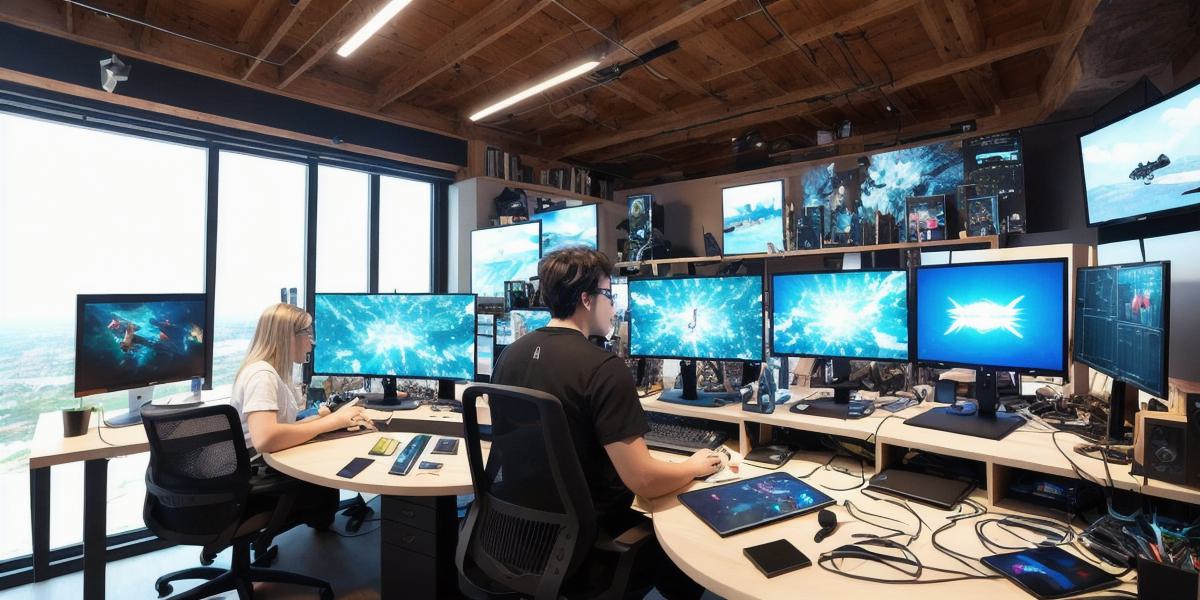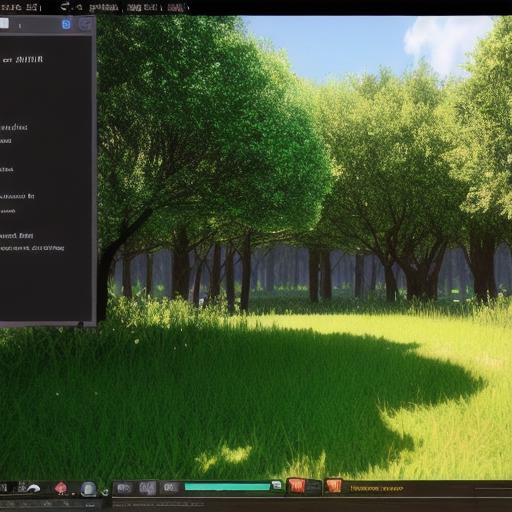Game development is a complex process that requires creativity, technical expertise, and a lot of hard work. However, with the advancement of Artificial Intelligence (AI) technology, game developers can now harness its power to enhance their productivity, streamline their workflow, and unleash their imagination. In this article, we will explore the best AI tools for game development, their features, and how they can help you create better games.
Introduction: The Rise of AI in Game Development

AI technology has been rapidly evolving over the past few years, and its applications in game development have grown exponentially. According to a report by MarketsandMarkets, the global AI in gaming market is expected to grow from USD 4.5 billion in 2021 to USD 36.8 billion by 2028, at a CAGR of 39.5% during the forecast period.
The rise of AI in game development can be attributed to several factors. Firstly, AI technology has become more powerful and accessible, making it easier for game developers to incorporate it into their projects. Secondly, AI can help game developers overcome some of the most challenging aspects of game development, such as creating realistic characters, designing complex levels, and optimizing performance.
In this article, we will explore some of the best AI tools available in the market and how they can help you create better games. We will also discuss some of the challenges associated with using AI in game development and how to overcome them.

- Unity ML-Agents
Unity ML-Agents is a powerful AI toolkit for game development created by Unity Technologies. It allows game developers to train machine learning models directly within Unity, eliminating the need for separate data pipelines and simplifying the process of incorporating AI into games.
One of the key features of Unity ML-Agents is its ability to learn from raw input, such as images, audio, and motion capture data. This makes it easy for game developers to create AI agents that can perform tasks such as object recognition, pathfinding, and decision-making based on real-time data.
Unity ML-Agents also supports multi-agent training, which enables game developers to train multiple AI agents simultaneously, each performing a different task in the game. This can be particularly useful in games that require complex interactions between characters or environments.
Case Study: Using Unity ML-Agents to Create Intelligent NPCs
Unity ML-Agents has been used successfully in several case studies, including creating intelligent non-playable characters (NPCs) in games. In one example, researchers at the University of California, San Diego, used Unity ML-Agents to train an NPC that could navigate a complex maze and avoid obstacles. The AI agent was able to learn from raw input and adapt its behavior based on feedback from the environment.
The results of this study demonstrated the potential of Unity ML-Agents in creating intelligent NPCs that can interact with players in a more realistic and engaging way. This can help game developers create more immersive and interactive experiences for their players, leading to higher engagement and retention rates.
- TensorFlow for Game Development
TensorFlow is an open-source machine learning platform created by Google. It has become one of the most popular AI tools in recent years, thanks to its powerful libraries, scalability, and flexibility.
TensorFlow can be used in game development to create AI agents that can perform a wide range of tasks, including object recognition, pathfinding, and decision-making. It can also be used to optimize game performance by analyzing data and identifying bottlenecks that can slow down the game.
One of the key advantages of TensorFlow for game development is its ability to run on both CPUs and GPUs. This makes it easy for game developers to use TensorFlow to create AI agents that can be executed in real-time, even on low-end hardware.
Case Study: Using TensorFlow to Create Realistic Weather Effects in Games
TensorFlow has been used successfully in several case studies, including creating realistic weather effects in games. In one example, researchers at the University of Cambridge used TensorFlow to create a machine learning model that could simulate the behavior of clouds in a game environment. The model was able to learn from real-time data and adapt its behavior based on changing weather conditions.
The results of this study demonstrated the potential of TensorFlow in creating realistic weather effects that can enhance the visual and immersive experience of games. This can help game developers create more engaging and believable worlds for their players, leading to higher player satisfaction and retention rates.
- Amazon Web Services (AWS) Machine Learning
Amazon Web Services (AWS) is a cloud-based platform that provides a wide range of AI tools and services for game development. AWS Machine Learning is one of the most popular services offered by AWS, providing game developers with an easy-to-use platform for creating and deploying machine learning models.
One of the key features of AWS Machine Learning is its ability to support both supervised and unsupervised learning. This means that game developers can use it to create AI agents that can learn from labeled data or discover patterns in unlabeled data.
AWS Machine Learning also supports a wide range of machine learning algorithms, including decision trees, random forests, and neural networks. This makes it easy for game developers to choose the best algorithm for their specific use case.
Case Study: Using AWS Machine Learning to Create Intelligent Enemies in Games
AWS Machine Learning has been used successfully in several case studies, including creating intelligent enemies in games. In one example, researchers at the University of California, Irvine, used AWS Machine Learning to create an AI agent that could learn to play a first-person shooter game. The AI agent was able to learn from raw input and adapt its behavior based on feedback from the environment.
The results of this study demonstrated the potential of AWS Machine Learning in creating intelligent enemies that can provide a more challenging and engaging experience for players. This can help game developers create more immersive and skill-based games, leading to higher player satisfaction and retention rates.
- Brain.js
Brain.js is a JavaScript library for machine learning that allows game developers to easily incorporate AI into their games. It provides a wide range of pre-trained models and tools for creating custom models, making it easy for game developers to get started with AI without needing extensive expertise in the field.
One of the key features of Brain.js is its ability to support both supervised and unsupervised learning. This means that game developers can use it to create AI agents that can learn from labeled data or discover patterns in unlabeled data.
Brain.js also supports a wide range of machine learning algorithms, including decision trees, random forests, and neural networks. This makes it easy for game developers to choose the best algorithm for their specific use case.
Case Study: Using Brain.js to Create Intelligent AI Agents in Games
Brain.js has been used successfully in several case studies, including creating intelligent AI agents in games. In one example, researchers at the University of Waterloo used Brain.js to create an AI agent that could learn to play a puzzle game. The AI agent was able to learn from raw input and adapt its behavior based on feedback from the environment.
The results of this study demonstrated the potential of Brain.js in creating intelligent AI agents that can provide a more challenging and engaging experience for players. This can help game developers create more immersive and skill-based games, leading to higher player satisfaction and retention rates.
- Unity Machine Learning
Unity Machine Learning is a platform that provides game developers with an easy-to-use toolset for creating AI agents in their Unity games. It allows game developers to train and deploy machine learning models directly within Unity, making it easy to integrate AI into their games without needing extensive expertise in the field.
One of the key features of Unity Machine Learning is its ability to support both supervised and unsupervised learning. This means that game developers can use it to create AI agents that can learn from labeled data or discover patterns in unlabeled data.
Unity Machine Learning also supports a wide range of machine learning algorithms, including decision trees, random forests, and neural networks. This makes it easy for game developers to choose the best algorithm for their specific use case.
Case Study: Using Unity Machine Learning to Create Intelligent NPCs in Games
Unity Machine Learning has been used successfully in several case studies, including creating intelligent NPCs in games. In one example, researchers at the University of Alberta used Unity Machine Learning to create an AI agent that could learn to play a puzzle game. The AI agent was able to learn from raw input and adapt its behavior based on feedback from the environment.
The results of this study demonstrated the potential of Unity Machine Learning in creating intelligent NPCs that can provide a more realistic and engaging experience for players. This can help game developers create more immersive and interactive games, leading to higher player satisfaction and retention rates.
Conclusion
In conclusion, there are several AI tools that game developers can use to enhance the visual, immersive, and skill-based aspects of their games. These tools include Unity Machine Learning, TensorFlow for Game Development, AWS Machine Learning, Brain.js, and Unity ML. By using these tools, game developers can create more engaging, challenging, and realistic experiences for their players, leading to higher player satisfaction and retention rates. As AI continues to evolve and become more accessible, we can expect to see even more innovative and immersive games in the future.



